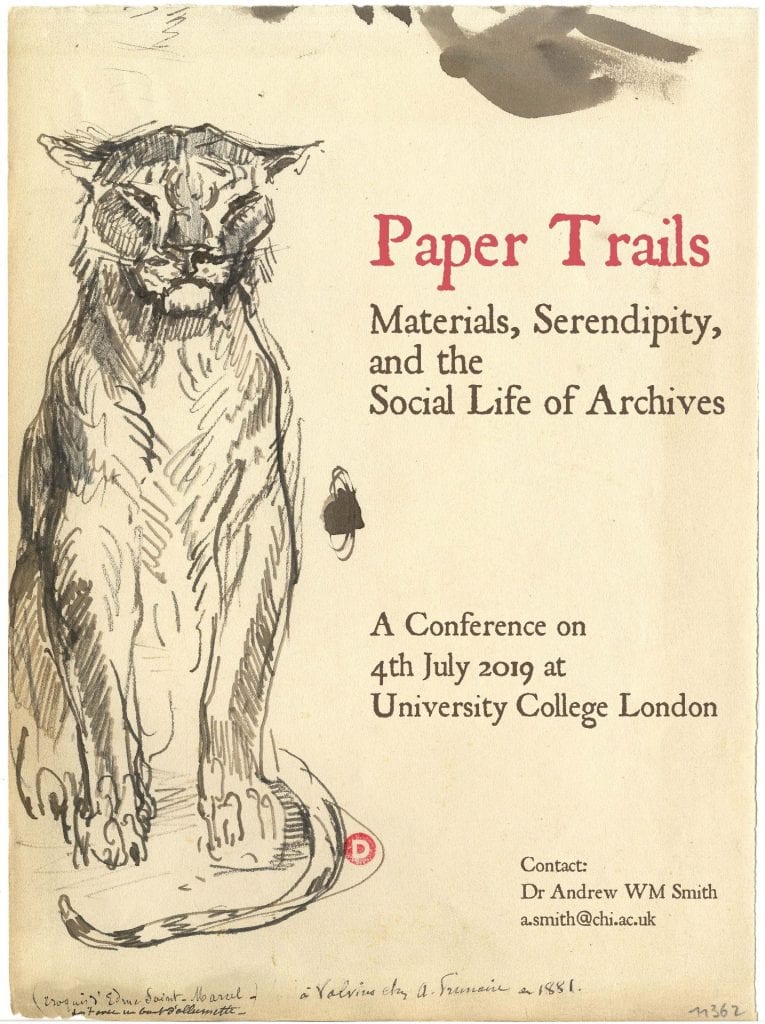Call for Papers for ‘Paper Trails’ a new open access publication with UCL Press
By Nazlin Bhimani, on 23 August 2019
Often there is more than research inside the books we read. Bookmarks, train tickets, receipts, and menus tucked into pages offer clues about the life of the book itself.
 Yet the lives of our research material often go unmarked, lost between the gaps in disciplinary boundaries and narrow definitions. The biographies of books and documents can illuminate their contexts, as printed matter that is sold, passed down or abandoned. What happens when we consider the three moments of production, transmission, and reception together with our own research stories? Documents, like people, have births, lives, and even deaths, so what does it mean to investigate the biographies of texts, objects, and archival records? Beyond the formal roles of cataloguing and archiving, what part do researchers play in shaping the emergent archive?
Yet the lives of our research material often go unmarked, lost between the gaps in disciplinary boundaries and narrow definitions. The biographies of books and documents can illuminate their contexts, as printed matter that is sold, passed down or abandoned. What happens when we consider the three moments of production, transmission, and reception together with our own research stories? Documents, like people, have births, lives, and even deaths, so what does it mean to investigate the biographies of texts, objects, and archival records? Beyond the formal roles of cataloguing and archiving, what part do researchers play in shaping the emergent archive?
This is not strictly an intellectual history, nor even a material book history, but something more like a social history of ideas, inspired by work such as Antoinette Burton’s discussions of Archive Stories (Duke University Press, 2005), Arlette Farge’s reflection on the Allure of the Archives (Yale University Press, 2013), Lisa Jardine’s discussion of Temptation in the Archives (UCL Press, 2015), and Ann Laura Stoler’s call to read Along the Archival Grain (Princeton University Press, 2009). Indeed, the stories of our research material evolve significantly over their life cycles, as Arjun Appadurai outlined in The Social Life of Things (Cambridge University Press, 1986). Beyond commodities and value, however, this new publication seeks to consider our affective relationship with research material, juxtaposing critical histories with reflections on practice.
The editorial board invite contributors to submit papers to be published in a BOOC (Book as Open Online Content), a fully open access platform with UCL Press described as “a living book”. We are interested in a broad geographical and chronological scope and actively welcome a diverse range of topics and authors.
We will look to publish material in four streams, which will allow us to set fully REF compliant academic work alongside work produced by practitioners for their professional development:
- Research Stories (8-10,000 words): We are encouraging a focus on research stories to invite a more reflective methodology, offering a more inclusive and engaged commentary on the work involved in researching, ordering, and preserving the past. This section will consist of double-blind peer-reviewed academic articles.
- Co-Production (flexible word count): Outputs from projects in which non-academic, undergraduate and taught postgraduate audiences collaborate with others (collection professions, academics, members of the public etc) to create new work that is based on research collections.
- Collection Profiles (500 words): This stream consists of shorter, descriptive or even narrative pieces, that highlights items or collections of interest. This may be a prelude to a piece of in-depth research, but it does not necessarily need to be.
- Engagement (2,000 words): Reflective pieces that focus on a broad range of engagement activities, from the professional’s perspective. These can be case studies, or ‘think pieces’ on particular skills or techniques. They should inform professional practice.
Please send in proposals for publications in these streams, along with a brief biographical presentation.
Deadline for submissions is 31st January 2020. For further information, please contact the lead editor, Dr Andrew WM Smith (University of Chichester) – a.smith@chi.ac.uk
 Close
Close



